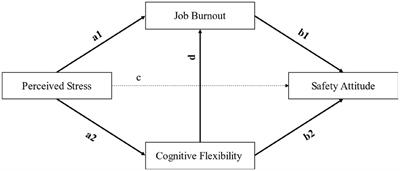The Mechanisms Linking Perceived Stress to Pilots' Safety Attitudes: A Chain Mediation Effect of Job Burnout and Cognitive Flexibility
This study unveils that the relationship between pilots' perceived stress and safety attitudes is not a straightforward causal link but rather intricately influenced by other variables.

Approaching the issue through the lenses of job burnout and cognitive flexibility, our research systematically investigates the roles of these factors in the nexus between perceived stress and safety attitudes. This provides a novel theoretical perspective, expanding our comprehension of the mechanisms shaping pilots' psychological well-being and safety attitudes.2) Empirical Validation of Amplification Effects: By delineating the three dimensions of job burnout, our research empirically substantiates the transmission and amplification effects of stress. Quantifying the inherent logic in the connections among perceived stress, cognitive flexibility, job burnout, and safety attitudes contributes to advancing the corresponding theories.3) Practical Insights for Augmented Safety: Proposing the mediating roles of job burnout and cognitive flexibility offers practical insights for enhancing pilot safety attitudes.Recommendations for airlines include strengthening organizational support, improving working conditions, providing positive feedback, and conducting cognitive training programs to alleviate the impact of perceived stress on safety attitudes..
Read the full article at the original website
References:
